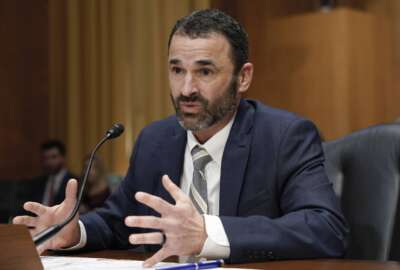TSP participants can now make unlimited checks into loan applications, at any time
In today's Federal Newscast: TSP participants can now check on their loan applications at any time, as often as they would like. Dozens of companies are urging...
- More than 200 employees at the Department of Homeland Security face a potential reassignment if Congress doesn’t act by the end of the year. The authority and funding for DHS’s Countering Weapons of Mass Destruction (CWMD) Office terminates on Dec. 21. If Congress doesn’t pass legislation to reauthorize CWMD, DHS is preparing to offer contingency reassignments to employees who work at the office. “There's lots of moving pieces, there are lots of processes. But it's important that we get this right for our employees," Mary Ellen Callahan, assistant secretary for CWMD, told Federal News Network in an interview. Employees will have until November 17 to choose a reassignment at another DHS office. If Congress doesn’t act, those reassignments will take place on December 17. (DHS to offer ‘lifeboat’ reassignments to employees in expiring CWMD office - Federal News Network)
- More military members than ever are enrolled in the Thrift Savings Plan's blended retirement system. There are now more than 1.3 million participants in the military's newer retirement program. That "blended" system, which first launched five years ago, just surpassed enrollment for the military's legacy retirement system. The blended program sets up new enrollees with both a traditional military pension and a TSP account. The idea is to offer military members more retirement savings options early on. That is because many members do not reach the 20-year service requirement to qualify for a military pension. (Military member enrollment in TSP’s blended retirement system reaches record high - Federal News Network)
- The IRS is touting better customer service through its hiring surge, but a watchdog is raising concerns about attrition. The IRS spent about $2 billion to help rebuild its workforce and modernize its legacy IT systems. That is out of about $60 billion available for the next decade under the Inflation Reduction Act. IRS Commissioner Danny Werfel said those funds made it possible to answer 87% of calls this filing season. “With the IRA funding, we’re clearly making a difference,” Werfel said. But keeping those new hires remains a challenge. The Government Accountability Office warns the IRS is losing about a quarter of its new recruits within two or three years on the job. (IRS touts better customer service through hiring surge, but GAO warns of high attrition - Federal News Network)
- The Department of Veterans Affairs is laying out three new priority customer experience journeys to continue to improve its services. The VA is focusing on three major areas over the next few years to improve customer experience. The first one is the transition from military to civilian. The second is around telehealth. John Boerstler, VA's chief veterans experience officer, said the third one is around agency employees called total experience. "How might we better institute employee experience and streamline our customer experience and tether them to one another, and ensure our workforce understands how to do that, and we training them and giving them the tools and resources that they need to be successful," Boerstler said.(AFFIRM/AGA CFO-CIO Webinar - Association for Federal Information Resources Management )
- Former President Donald Trump did not influence the FBI’s decision on its future headquarters, according to the Justice Department’s inspector general. FBI Director Chris Wray said Trump “tapped the brakes” on plans to move the FBI outside of Washington, D.C., because it didn’t make sense to him. But Wray told the IG’s office the decision came down to his preference to keep the FBI close to the DOJ’s own headquarters downtown. That marked an abrupt change in plans made under the Obama administration to relocate the FBI to suburban Maryland or Virginia. The Biden administration revived plans for a suburban FBI headquarters, but has yet to decide on a final site.
- Federal facilities in Georgia, Alabama and Mississippi will get cleaner electricity soon, as the government works toward its goal of carbon pollution-free electricity for federal operations by 2030. The General Services Administration signed an agreement with utility provider Southern Company to let federal facilities buy cleaner energy. This agreement is the fourth between GSA and a utility company to help meet the Biden administration's sustainability goals. Facilities in these three states will join those in the Midwest and D.C. that can buy carbon-free electricity.(Federal agencies in three southern states will get cleaner energy - Federal News Network)
- Thrift Savings Plan participants can now check on their loan applications at any time and as often as they would like. In TSP's My Account platform, a new "loan tracker" lets applicants take a look at all the steps of the process. They will be able to see what to-do items are already complete and what is still in progress. And the Federal Retirement Thrift Investment Board has bigger plans for this too. The board is looking to add tracking options for other things, like withdrawals from the TSP. Eventually, participants will also be able to get text message alerts when there has been a change in their application.(New loan tracker in My Account - Federal Retirement Thrift Investment Board)
- Dozens of companies are urging Congress to approve a proposal to create a $1 billion hedge portfolio to quickly deploy commercial technology. The companies are represented by a Silicon Valley advocacy group. In a letter, the Silicon Valley Defense Group said the funding and other measures could help companies work with the Defense Department more easily. It could also help DoD use non-traditional and commercial technologies. The Defense Innovation Unit would manage the portfolio.(Companies want Congress to approve $1B DIU hedge portfolio - Silicon Valley Defense Group)
- A new online tool should help streamline Freedom of Information Act (FOIA) requests. The Justice Department this week unveiled the addition of a search tool to FOIA.gov. It can help users connect with the right agency to make a FOIA request or find information that is already publicly available more quickly and easily. DoJ said the tool uses a combination of programmed logic and machine learning. The agency plans on updating the search tool over time to make it more efficient and user friendly.
- Cyber Command will search for publicly known malware on Defense Department networks and systems to improve how it performs its operations, which will occur this month during the International Coordinated Cyber Security Activity (INCCA), when cyber experts perform these defensive actions. Potential threats will be shared with partners, as INCCA will help cyber teams improve their processes, readiness and coordination with those partners. The program is part of Cyber Command's efforts to improve its collective defense of DoD networks and systems, and work more closely with international partners.(Cyber Command is looking for known malware on DoD networks - Cyber Command)
Copyright © 2025 Federal News Network. All rights reserved. This website is not intended for users located within the European Economic Area.
Peter Musurlian
Peter Musurlian is a producer at Federal News Network.
Follow @PMusurlianWFED






